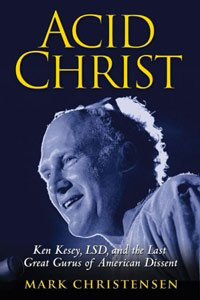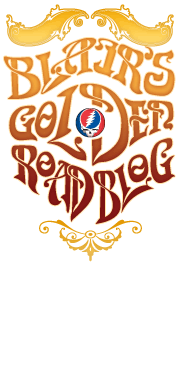If only I'd read the "Acknowledgments" first. Silly me, I read books front to back, and the “Acknowledgments” appear on page 415 of Mark Christensen's non-biography of Ken Kesey, Acid Christ: Ken Kesey, LSD, and the Politics of Ecstasy (Schaffner Press). So I was finished with the book and had already tossed it down in disgust when I read the author's "explanation" for his approach to the book:
"Acid Christ was born from my publisher's idea of a 'participatory biography.' Unlike conventional biography which keeps its subject at arm's length and attempts at every level to be fair and balanced, a 'participatory biography' would be the tale of how a major modern cultural figure, in this case Ken Kesey, effected [sic] the life of the author personally and subjectively. I believe this to be the best new format idea ever invented…"
Well, with no due respect, Mark, you are wrong. Day after day when I was reading this book, I would mutter to my wife, or even the cat, "This guy hates Kesey… He doesn't get Kesey… It's all about the author, and he's an asshole… Why should I care about his own tawdry drug stories and sex life?... I can't believe I shelled out nearly 30 bucks for this!" I can't recall if it was my wife or my cat that first asked me to stop whining. Alas, I could not oblige.
As one who has long been fascinated by Kesey, has studied his role in the development of the West Coast counterculture, and also had the good fortune to interview him twice for my Dead 'zine The Golden Road (including one story based on an entire day my wife, Regan, and I spent with him on his farm in the summer of '86), I was very excited when I learned about what was being touted as the first biography of the man. But it becomes very clear that Christensen, who admits early on he is a frustrated novelist himself, has very little respect for Kesey and the path he took; indeed as early as page 17, the author asks, "So why did Kesey's life seem to go so far downhill after those two novels [One Flew Over the Cuckoo’s Nest and Sometimes a Great Notion]?" You see, Christensen adopts the typical straight-world line that Kesey threw away his talent and his future when he got into acid, hooked up with the Merry Pranksters and stopped writing novels. He believes Kesey turned into an ego-maniacal fame whore, though the actual details of Kesey's life post-Acid Tests hardly point to a person who's constantly seeking publicity and attempting to appear oracular; quite the contrary.

But then, there is precious little actual Kesey biography in this book — there's much more Mark Christensen biography — and what's here is at best surface gloss, at worst largely negative conjecture and opinion based on one or two oddball sources. For all the recounting of his own drug adventures, Christensen doesn't appear to understand either LSD or the acid culture, and he definitely doesn't understand the Grateful Dead and their role in the early story:
"And there was the New Music. From above or below. The Grateful Dead, Kesey's church choir, sang acid-blasted inverted hymns of deliverance and cohesion. But the Dead were not psychedelic or, even particularly, about peace and love. Their music wasn't half as spacey as David Crosby's, the Beatles or the Electric Prunes. I know of few Dead love songs, fewer Dead political songs — the themes that stagger to mind lean more to the side of drug bust, arrest, and incarceration…"
Uh, right, Mark. Whatever you say. Here's the thing: Christensen is actually a pretty good writer. He can be quite witty, clever and perceptive. His literary analysis of Kesey's books is well done. He peppers the books with juicy quotes from Kesey interviews (presumably what any biographer would do). His discussion of the controversy surrounding Kesey's late-life book The Last Go Round is eye-opening —but completely one-sided. It's significant that none of the major players in Kesey's life appear to have co-operated with Christensen. This is a guy who had an agenda.
I'm not implying, either, that Kesey was some sort of saint without flaws, above criticism. Far from it, obviously. But in the end, Acid Christ is not really a biography of Ken Kesey; it's more like a gangland hit job. Caveat emptor. Someday, someone will tell this story the right way.
By now, I should be used to people getting the '60s, and the counterculture, so wrong in books and films. But it still hurts every time it happens. I'm quietly living in fear of the film that's coming of Tom Wolfe's brilliant book, The Electric Kool-Aid Acid Test, 'cause I just know they're gonna blow it. And don't get me started on the prospective Jerry bio-pics…
What books and films do you think have succeeded in capturing some of the truth and essence of that era, or the hippie counterculture in general?
dead comment
Wow. What a wretched title.
actually, it was more of a "oerionlasklweioojkla" announcement.
one more thing...
a picture of jerry
sheesh. kesey is dead.
Much appreciated
"Someday, someone will tell this story the right way."
Krassner...
films and books
Lost Book
Different sub-title?
the era
books & films....
The Grateful Dead Movie.....
but what do you really think of the book?! : )
Hye c'mon -- Thom Wolfe EKAA-AT
Simonrob...
Review
Kesey Bio
movies and books
Oh, man...
... I watched some of "Alice B. Toklas" the other day on TCM and I was kinda embarrassed that I had liked it back in the 60s when it came out. I think the teenage me back then was smitten by the lovely Leigh Taylor-Young as the lead, rarely clothed hippie chick... Another film I liked back then but would doubtless hate today was "Joe," starring Peter Boyle as a working stiff who goes down to Greenwich Village to extract his daughter out of hippie colony there...Of course for pure camp value it's hard to beat "Wild in the Streets." And Russ Meyer's "Beyond the Valley of the Dolls"...
Totally agree about the Muddy Waters bio, too. Wonderful. The Howlin Wolf one "Moanin' at Midnight" is also excellent.




